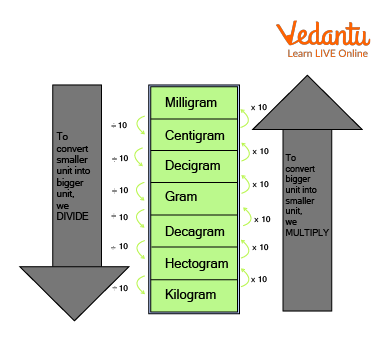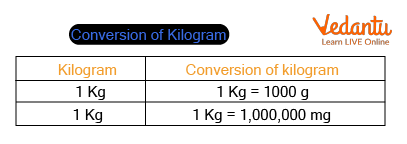




Step-by-Step Method to Convert Kilograms to Grams
The term “Measurement” describes the quantity of any object either in a solid or liquid state.
It helps to know the unit of every shape. There are basic units to measure the weight, length, and capacity of different shapes.
Measures of Mass: The quantity of matter or substance that makes up a thing is known as its mass. Mass is the measure of matter in an object. A unit of measurement is kilograms, abbreviated as kg.

Which is Heavier?
Can you tell us which one is heavier in the above image? Whose weight would be in Kg?
Yes, which one is heavy is depicted by the size of small and large but to know how much, we need to use a tool like a weighing machine to know the accurate weight.
Mass v/s Weight: It's crucial to keep in mind that mass differs from the weight. While weight varies with changes in gravity, mass never changes.
Weighing is how we determine the mass, yet weight and mass are not the same.
The most typical measurements are as follows:
Grams
Kilograms
Tonnes
Tonnes are the largest, while Grams are the smallest.
Here, the kilogram conversion is explained in detail. Few solved examples are shown below on how to convert kg into grams.
Grams
An average paper clip weighs one gram.

Paperclip
Let’s understand this through an activity.
Activity: One little paperclip should be held in your hand. Does that have much weight? No! Grams are quite light. This explains why items are frequently measured in hundreds of grams.
Since the abbreviation "g" for grams is frequently used, "300 g" stands for "300 grams."
The average loaf of bread weighs 700 g. (for a nice-sized loaf).
Kilograms
A kilogram is a unit used to measure mass.
Kilograms are excellent for weighing objects that people can lift, yet occasionally very powerful individuals are required.
1,000 grams make up 1 kilogram.
For example, an average dictionary weighs roughly one kilogram.

Dictionary
Another example is 1 kilogram of gold. The weight of this gold bar is similarly one kilogram.

Gold
Since kilograms are sometimes written as kg ("k" for "kilo" and "g" for "gramme"), "10 kg" refers to ten kilograms.

Weighing Machine
Our weight is measured on scales in kilograms. An adult typically weighs 70 kg.
But we must use the tonne when referring to extremely hefty items.
Kilogram Conversion
There are seven basic units used in kilogram conversion.
Milligrams
Centigrams
Decigrams
Gram
Decagrams
Hectograms
Kilograms
This is present in decreasing order means, a milligram is the smallest and a kilogram is the highest. To convert a smaller unit into a bigger unit we divide it by 10 and to convert a bigger into a smaller we multiply it by 10.

Conversion
Grams to Kilograms
The International System of Units also defines a gram as a unit of mass (SI). It weighs 0.001 kilograms. It is used to measure light things like pens and candy bars and is represented by the sign "g".
As a result, 1 kilogram (Kg) equals 1000 grams is the relationship between kilogram and grams (g).
Grams to Kilogram = 1g = 0.001 kg
Kilogram to Gram = 1 kg = 1000 g
Kilogram to Milligrams
As 1 gram (g) is equal to 1000 milligrams (mg), hence the relation between kilogram and milligrams is given as, 1 kilogram (kg) = 1000000 milligrams (mg).

Conversion of Kilogram
Below are the few solved examples and practice problems on how to convert kg into gram.
Solved Example
Q1. Convert the following kilogram into grams.
(a) $2 \mathrm{~kg}$ into $\mathrm{g}$
Ans: $1 \mathrm{~kg}=1000 \mathrm{~g}$
$2 \mathrm{~kg}=2 \times 1000 \mathrm{~g}$
$=2000 \mathrm{~g}$
(b) $5 \mathrm{~g}$ into $\mathrm{kg}$
Ans: $1 \mathrm{~g}=\dfrac{1}{1000} \mathrm{~kg}$
$5 \mathrm{~g}=(\dfrac{5}{1000}) \mathrm{kg}$
$=0.005 \mathrm{~kg}$
(c) $1 \mathrm{~kg} 506 \mathrm{~g}$ into $\mathrm{g}$
Ans: $1 \mathrm{~kg}=1000 \mathrm{~g}$
$1 \mathrm{~kg} 506 \mathrm{~g}=1 \times 1000 \mathrm{~g}+506 \mathrm{~g}$
$=1000 \mathrm{~g}+506 \mathrm{~g}$
$=1506 \mathrm{~g}$
(d) $5 \mathrm{~kg} 124 \mathrm{~g}$ into $\mathrm{g}$
Ans: $1 \mathrm{~kg}=1000 \mathrm{~g}$
$5 \mathrm{~kg} 124 \mathrm{~g}=(5 \times 1000) \mathrm{g}+124 \mathrm{~g}$
$=5000 \mathrm{~g}+124 \mathrm{~g}$
$=5124 \mathrm{~g}$
(e) $15 \mathrm{~g}$ into $\mathrm{kg}$
Ans: $1 \mathrm{~kg}=1000 \mathrm{~g}$
$15 \mathrm{~g}=(15 \times 1000) \mathrm{g}$
$=15000 \mathrm{~g}$
Practice Problems
1. Convert the following:
(a) 5g into kg
(b) 5kg 64g into kg
(c) 6kg into g
Ans:
(a) 0.005kg
(b) 5.064kg
(c) 0.006g
Summary
The kilogram is employed to weigh things with a medium to high density. Body weight, vegetables, and fruits are all measured in kilograms, which are represented by the sign "kg," where "k" stands for kilo and "g" for gram. There are so many different-sized and-weighted items all around us. The same mass is being measured in different units. There are different units of measurement of mass. Like Kilogram, milligram, centigram, etc.
FAQs on Kilogram to Gram Conversion Made Easy
1. What is the basic relationship between a kilogram (kg) and a gram (g)?
A kilogram and a gram are both units used to measure mass in the metric system. The gram (g) is the base unit, while the kilogram (kg) is a larger unit. The fundamental relationship is that 1 kilogram is equal to 1,000 grams. Grams are typically used for measuring lighter objects, while kilograms are used for heavier ones.
2. What is the formula to convert kilograms to grams?
To convert a value from kilograms (kg) to grams (g), you must multiply the number of kilograms by 1,000. The conversion formula is:
Grams = Kilograms × 1,000
For example, to convert 7 kg to grams, you would calculate: 7 × 1,000 = 7,000 g.
3. How do you convert grams back to kilograms?
To convert a value from grams (g) to kilograms (kg), you must divide the number of grams by 1,000. The conversion formula is:
Kilograms = Grams ÷ 1,000
For instance, if you have 3,500 grams of flour, you would calculate: 3,500 ÷ 1,000 = 3.5 kg.
4. Can you show an example of converting a fractional kilogram, like 1/4 kg, to grams?
Certainly. To convert a fraction or decimal of a kilogram to grams, you still use the same principle: multiply by 1,000.
First, convert the fraction to a decimal: 1/4 = 0.25.
Now, apply the formula:
0.25 kg × 1,000 = 250 g
So, 1/4 kg is equal to 250 grams.
5. What is the real-world difference between mass (measured in kg) and weight?
This is a common point of confusion. The key difference is the effect of gravity.
- Mass is the measure of how much matter an object contains. It is constant, no matter where the object is. It is measured in kilograms (kg) or grams (g).
- Weight is the measure of the force of gravity acting on an object's mass. It can change depending on the gravitational pull. For example, your mass would be the same on Earth and the Moon, but your weight would be much less on the Moon because its gravity is weaker.
6. Why are there exactly 1,000 grams in one kilogram?
The number 1,000 is not random; it is a core feature of the metric system. The system is based on powers of ten to make conversions simple. The prefix 'kilo' literally means one thousand. So, a 'kilogram' means one thousand grams, just as a 'kilometre' means one thousand metres. This base-ten structure makes calculations much easier than in systems with irregular conversion factors.
7. In what real-life situations is it more practical to use grams instead of kilograms?
It is more practical to use grams when measuring the mass of small or lightweight items where precision is important. Common examples include:
- Cooking and Baking: Measuring ingredients like spices, baking powder, or yeast.
- Jewellery: Measuring the mass of precious metals like gold and silver.
- Science Labs: Measuring chemicals for experiments where small quantities are critical.
- Groceries: Measuring small items like a handful of nuts, a single chilli, or a bunch of herbs.
8. What's a simple trick to remember when to multiply or divide for kg-g conversions?
A very easy way to remember is to think about the size of the unit you are converting to.
- When converting from a BIG unit (kg) to a SMALL unit (g), your final number should be bigger, so you MULTIPLY.
- When converting from a SMALL unit (g) to a BIG unit (kg), your final number should be smaller, so you DIVIDE.























